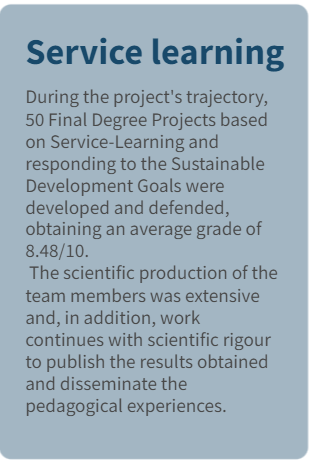Championing social justice with ethical pedagogies
Course Summary:
The course “Transforming realities: University and Community cooperating to humanise education through Service-Learning in Final Degree Projects” was started in 2018. Here, students of Infant and Primary Education Degrees were made to design, implement and evaluate a community-based project. The projects in question are organized to respond to social needs of vulnerable communities and aim to minimise inequality whilst promoting social justice and values of sustainable development.
The project, set up by Campus Bizia Lab programme at the University of the Basque Country (UPV/EHU), also enables students, teaching staff and administrative/services staff build relations with each other and their respective communities. The primary goals of the course are to enable participants build professional competencies and imbibe values of education for sustainability while learning to critically reflection on societal justice.
Course Design:
- Commitment to Social Justice
The course prioritized social justice by fostering pedagogies aligned with diversity and ethical imperatives to combat inequalities. The Service-Learning method engaged students in community activities focusing on themes such as inclusion, equity, gender, and more. Collaborations between educational institutions, social bodies, and administration were further forged in the process.
- Service Learning Approach

The Service-Learning approach was integrated into the Final Degree Project, cultivating interdisciplinary, inclusive, and transformative perspectives. Sustainable Development Goals like Quality Education, Gender Equality, and Reduced Inequalities guided these service areas.
Chosen services addressed immediate student context, critiquing policies and social issues, fostering community benefits, while developing cognitive and emotional skills, and cultural responsibility. The course encouraged critical analysis of injustices and proposition of equitable solutions, fostering teamwork and practical application within the community.
University mentors supported students in practical aspects and reflective processes during their projects. The course aimed to bridge academic learning and community service, building tangible links between them.
- Feedback and Assessment
The structure and implementation of the Service-Learning project were planned well in advance and constantly monitored. The Service-Learning project's structure was pre-planned and under constant supervision. Regular feedback exchanges within student groups promoted teamwork. Pedagogical research enabled reflective evaluation, accompanied by training in documentation techniques and ethical standards. Ethnographic narration fuelled critical reflection and self-regulated learning. The faculty guided students through academic tutoring, mediating their training.
In the following video, you can watch designers of the course explain their motivations, processes and experiences of implementing the course.
Contact:
Rakel Gamito Gomez,
